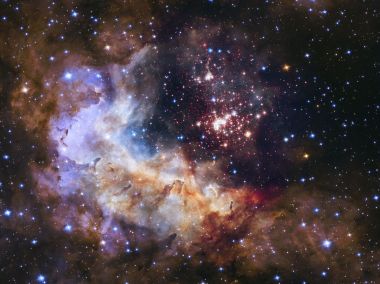'If you think you know everything about God, then your religious faith is at fault' says Vatican's new astronomer

Religion supports astronomy and religious people should not be afraid of the scientific study of celestial objects, according to the pope's new astronomer.
Guy Consolmagno, new director of the Vatican Observatory and, like Pope Francis a Jesuit, says in an interview with Science that it is often religious people who most need to see that religion supports astronomy.
"They need to know that astronomy is wonderful and that they shouldn't be afraid of it. I often quote John Paul II, when he said of evolution that 'truth cannot contradict truth'. If you think you already know everything about the world, you are not a good scientist, and if you think you know all there is to know about God, then your religious faith is at fault."
In addition, he said, God was the reason scientists do astronomy. "I would say that is true even if you don't believe in God. We do it first of all because we can, because the universe acts according to laws. That is a religious idea. The Romans, on the other hand, believed in nature gods that intervene according to whim — but if you believe in that you can't be a scientist. Believing in a supernatural god is different."
Dr Consoglmagno, aged 63, from Detroit, is a Jesuit brother, not a priest. The Vatican Observatory, based south of Rome at the pope's summer residence, employs a dozen astronomers to study asteroids, meteorites, extrasolar planets, stellar evolution, and cosmology. The Observatory also has a 1.8-meter telescope in Arizona, where the skies are clearer.
Consoglmagno told Science that he had discovered when serving with the US Peace Corps in Africa that even the most deprived peoples were interested in the subject. "I discovered that as soon as I said I was an astronomer, people wanted to know more. They didn't have running water but they wanted to look through a telescope."
He said the Vatican supports astronomy because it is an important part of being human. The Observatory was founded at the end of the 19th century by Pope Leo XIII to repair some of the damage the Church inflicted on itself by its persecution of Galileo. The 17th century scientist was tried by the Inquisition for heresy, condemned and kept under house arrest until his death for arguing that the earth and planets went around the sun and not the other way round, as most scientists at the time believed.
Dr Consoglmagno noted that the previous director of the Vatican Observatory, José Funes, was Argentinian, like Pope Francis. "When thinking of becoming a Jesuit, he asked a senior member of the order whether he should join then or complete his studies in astronomy first; he was advised to finish studying. The Jesuit who gave that advice was Jorge Bergoglio, who is now Pope Francis. Francis, who has a background in chemistry, was encouraging Jesuits to be astronomers 30 years ago."











